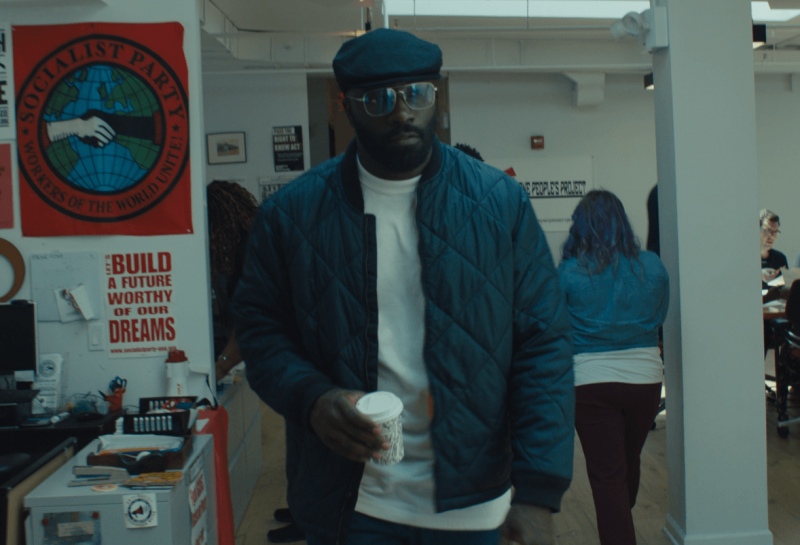Years ago, when Guy Nattiv set out to make his latest feature-length film, Skin, Hollywood was not interested. Nattiv told me, “They said ‘Look, Obama is the president. There are no neo-Nazis in the States. It’s just a myth.’” That was before Charlottesville and Pittsburgh and the U.S. president’s racist tweets about four congresswomen of color and the chants of “send her back,” which were directed at Rep. Ilhan Omar (D-Minn.) and heard at a presidential campaign rally.
It’s a good thing that Nattiv finally got to make his movie.
Recently, I was able to talk to Nattiv and to the two men that inspired the film. Skin tells the story of Bryon Widner's exit from white supremacy and how love — of his wife and children and his friendship with African American activist Daryle Jenkins — redeemed his life.
Nattiv’s decision to make Skin, as well as his Oscar-winning short, also called Skin, stems from his personal interest in redemption stories. Four of his grandparents are Holocaust survivors. When he talked to one of his grandfathers about the film, Nattiv was told that he had a role as a filmmaker to bring this story to the world. “He taught me, and all of our grandkids, how to forgive and how to accept someone who wants to be better.”
Skin, which opens in select theaters this weekend, starts with Bryon going through an excruciating tattoo removal. For most of the film, Bryon is practically covered from head-to-toe in tattoos. The scenes of this tattoo removal almost appear as a metaphor for Bryon’s journey back toward humanity. Byron told me that his tattoos were “an expression of getting people to fear us.” Us, in this case, were the skinhead groups that took Bryon in. He was a teenager and homeless when he was recruited.
“They’re looking for the disenfranchised. They're looking for the outcasts. They’re recruiting,” Bryon told me. “You pay attention to him, show him a little human decency, and that kid will kick over the gates of hell for you. It's a recruitment tactic, and we wanted to go and say that in the movie.”
These groups offer a kind of humanity while stripping their members of another.
This recruitment is depicted in one of the most chilling sequences of the film. Bryon (Jamie Bell) and Fred (Bill Camp), the head of the Vinlander Social Club go out looking for homeless kids. They pick one, Gavin, who looks hungry, ragged, and disheveled and offer him food, shelter, and community. Fred’s wife Shareen (Vera Farmiga), seduces Gavin into the fold with love and affection (non-sexual). Later on in the movie, Bryon asks Gavin why he’s there. Gavin admits that he was hungry.
Daryle pointed out to me, “If people of faith find [these kids] first, everything changes. It's a different dynamic, it's a different scenario in their lives, they find what they are looking for, for real.”
fvv4v5-g_1.png

What may be jarring for viewers is that the Skin continually points to Bryon’s humanity, even when he’s at his worst. Skin asks the audience to have empathy for Bryon and at times that becomes uncomfortable. It’s that hard work of empathy and human connection that eventually redeems Bryon.
As Daryle describes this hard work, in his friendship with Bryon, and in helping other skinheads through One People’s Project, he says he looks for their humanity. “And doing so reminds me of their humanity, first of all, but reminds them of theirs. And I've always been telling people that that's really the goal in the end … to remind them that they are human too.”
Through the love and family that Julie (Danielle Macdonald), Bryon’s partner, offers, he is reminded of his humanity. And it changes him. The Bryon at the start of the movie had no problem hurting a young African American boy; the Bryon at the end shows mercy to some Muslim men he was sent to kill. Later in the film, we see Daryle (Mike Colter), Bryon’s arch-nemesis, offer him friendship and help getting his tattoos removed. In real life, they bonded over a mutual love of punk music. To this day, they are still friends.
It’s this redemption-through-empathy that makes Skin a must-see, especially right now. Our current culture wars make it far too easy to take sides and dehumanize people. The temptation to hate goes beyond the public square and right through the doors of our houses of worship, pitting sisters and brothers against each other, causing us to be slow to listen and quick to speak and become angry.
As Christians, it can be all too easy, in the middle of legitimate battles for the soul of our country, to forget that we were once enemies in desperate need of Jesus’ hospitality. But he put on humanity, went out looking for us, took us in, and made us his own. He clothed us with his own righteousness and invites us to sit at his table. And even when we forget this truth about ourselves, his radical love and friendship is always on offer. It’s this love that has the power to heal and change us, to redeem the people we see as our fiercest enemies and turn them into family.
Got something to say about what you're reading? We value your feedback!







